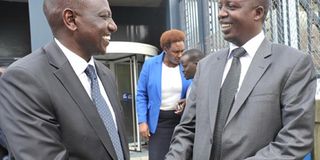Witnesses bribed, says ICC prosecutor Fatou Bensouda

Deputy President William Ruto with Tinderet MP Julius Melly outside International Criminal Court in The Hague on September 2, 2014. Ruto’s defence team Tuesday sought to distance him from claims that he incited youth to violence in the run-up to the 2007 elections. PHOTO | DPPS
What you need to know:
- Mr Ruto’s lead counsel, Mr Karim Khan, accused the prosecution of trying to divert the focus of the case.
- Mr Steynberg said much of the new evidence touched on Witnesses 604 and 495 and was meant to illustrate that they were influenced to recant their evidence.
Chief Prosecutor Fatou Bensouda has pleaded with ICC judges to admit the testimonies of nine witnesses in the case against Deputy President William Ruto, who recanted their evidence under unclear circumstances.
Ms Bensouda, through lawyer Anton Steynberg, said the witnesses should be compelled to appear before the judges to explain why they retracted their evidence, which she said was cogent.
Mr Steynberg presented to the court 80 documents as proof that the witnesses in the case against Mr Ruto and former radio presenter Joshua arap Sang had been interfered with.
The submission concerned the defence of Mr Ruto and Mr Sang.
But defence lawyers urged the judges to ensure that the new evidence was not used to heap blame on their clients that they were behind bribery and intimidation of witnesses.
'SHADOW CASE'
Mr Ruto’s lead counsel, Mr Karim Khan, accused the prosecution of trying to divert the focus of the case to justify continuing with it when it was “crumbling because it was poorly investigated”.
“The prosecution is trying to introduce a shadow case of witness intimidation and losing focus of the main case which is to demonstrate whether our clients played a role in the post-election violence in Kenya,” Mr Khan said.
However, Mr Steynberg said the new evidence, which Presiding Judge Eboe Osuji will on Thursday determine whether to admit, was valid.
The materials included a photograph of an unnamed witness visiting another at a protection house and offering money to a fellow witness, and an audio recording promising him a comfortable life “back in Kenya” if he dropped his evidence.
“This evidence is not meant to be prejudicial to the defence, but to demonstrate a wider picture of witness intimidation, which is affecting the integrity of this court,” Mr Steynberg said.
ASSESS CIRCUMSTANCES
The victims’ counsel supported the use of the new evidence, saying it would help the cause of justice by assessing the circumstances under which prosecution witnesses recanted their evidence.
Mr Steynberg said much of the new evidence touched on Witnesses 604 and 495 and was meant to illustrate that they were influenced to recant their evidence.
Judge Osuji cautioned the prosecution against its attempt to demonstrate the “wider picture”, saying it should only be used to demonstrate that a witnesses had been influenced.
Lawyer Katwa Kigen, for Mr Sang, said the prosecution was keen on heaping false allegations on his client and Mr Ruto on witness bribery and intimidation.
He argued that Witness 16 recanted his evidence because he discovered contradictions.
“Witness 16 is on record as having told the prosecutor that he recanted his evidence because he had contradicted himself and not because he was influenced.”
He accused the prosecution of presenting materials selectively to the court.
Judge Osuji gave Witness 604 until Thursday to testify via a video link from a secret location in Nairobi.





